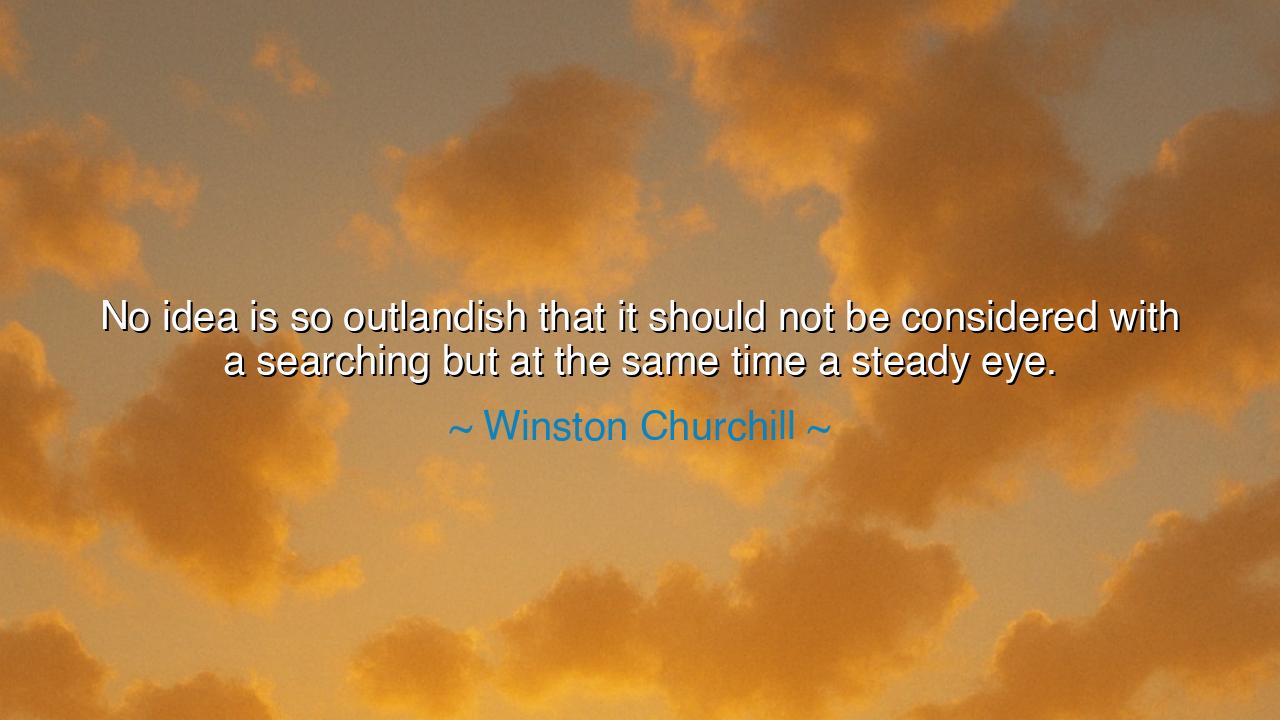
No idea is so outlandish that it should not be considered with a
No idea is so outlandish that it should not be considered with a searching but at the same time a steady eye.






Hear the words of Winston Churchill, forged in the fires of war and heavy with the weight of human destiny: “No idea is so outlandish that it should not be considered with a searching but at the same time a steady eye.” These words speak to the boundless realm of thought, to the courage required not only in battle, but also in the chambers of the mind. For an idea, however strange, however wild, is a seed. Some seeds perish in barren soil, yet others, dismissed at first, rise to become forests that shelter nations.
The ancients knew this truth. They taught that wisdom is not merely the preservation of tradition, but the openness to inspiration—even inspiration that seems foolish. For the searching eye must look boldly into the unknown, probing beyond fear or ridicule. But the steady eye must temper imagination with judgment, weighing possibilities with care. Thus, Churchill calls us to balance: to welcome even the most outlandish spark of thought, but to test it with reason, discipline, and foresight.
Consider the tale of Christopher Columbus, who set sail upon the belief—mocked by many—that unknown lands might lie westward. His idea was deemed preposterous, yet he dared to pursue it. The outcome reshaped the world, for better and for worse. Here lies the power of an outlandish idea: it can change the course of nations. But here too lies the warning: without a steady eye, such daring may unleash storms. To consider is not to accept blindly, but to test, to discern, to prepare.
Churchill himself lived by this principle. During the dark days of World War II, ideas arose that seemed desperate, even mad. Some advised surrender. Others suggested improbable defenses. Yet Churchill insisted on hearing them all, not because every idea was wise, but because in the wilderness of thought, salvation often hides. Indeed, strategies once dismissed as outlandish—such as using radar, or deceiving enemies with phantom armies—proved decisive in turning the tide of war. The steady eye saw through illusion, while the searching eye welcomed what tradition would have scorned.
This teaching is for all, not only for kings and generals. In daily life, how often do we dismiss a thought as too strange, too impractical, too unworthy of consideration? Yet history shows that many great discoveries, inventions, and works of art were born from what others first mocked. The idea that seems absurd today may become the truth that saves tomorrow. To close the mind is to wither. To open it is to walk in the company of visionaries.
But beware: the steady eye is as vital as the searching one. To embrace every outlandish notion without discernment is to be led astray by folly. The wise path lies in balance. Listen with openness, test with rigor, and move with courage when the heart of the idea proves sound. For vision without judgment is chaos, but judgment without vision is stagnation.
So let this be the lesson carried forward: consider every idea, no matter how strange, for within it may lie the seed of greatness. Yet do not be swept away by wonder alone—examine, weigh, refine, and then act. In your own life, give space for imagination, whether in your work, your dreams, or your relationships. Encourage voices that differ from your own. Do not scorn the new, nor cling blindly to the old. Be both bold and steady, both searching and discerning.
Thus, as Churchill has said, let no outlandish idea be cast aside without thought. For the world is shaped not by those who mocked the impossible, but by those who dared to consider it—and then, with steady hand, brought it forth into reality.






AAdministratorAdministrator
Welcome, honored guests. Please leave a comment, we will respond soon